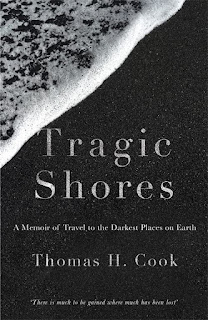Tragic Shores - Thomas H. Cook
Tragic Shores, for example, opens with pilgrimages to two contrasting sites of human misery; Lourdes and Auschwitz. The connections and the comparisons between these two locations are valid, both places being a focus of human suffering and pain, and as such, places that can't help but be defined, affected and tainted by their history. Reflecting on the vulgarity of the commercialism of Lourdes and the dubious promise of miracles, the author weighs the hope of the weak against it and can't help but be moved by the sight of humanity "as a vast tableau of woundedness and need". In Auschwitz, the feeling of helplessness one must feel against murder machine operating on an unthinkable scale is reduced to an encounter with a stranger at a border crossing that restores some faith that kindness can still be found in humanity.
This is the nature of travel to such tragic shores and Cook takes time to not understand the course of history that would run towards events of unimaginable horror, but to be open to what being present in those places offers. Even with considerable research and efforts made to not get caught up in a tourist travel bubble, trying to experience places as authentically as possible, one can never know what one's response will be in the actual location. Even in the a darkest of places, one can learn of little moments of kindness, and share an empathic experience with others, places where a little light can shine twice as bright.
Contrasts between the then and the now are always evident and sometimes quite revealing. The author with his wife and daughter as travelling companions reach Verdun via Disneyland to find that the crippled landscape at the front of the Great War remains unhealed, but still seems beyond a school group of German youths to be able to relate to what took place there. The authenticity of the memorials to the Disappeared in Buenos Aires is questioned, but there are still lessons to be learned about the bravery of those who challenge evil in all its forms, and the author recognises that it's often women who show the greatest strength, whether in Argentina, whether as "slaves of the slaves", whether protecting children from a terrorist attack in a mall in Nigeria, or even in the author's own personal experience in Tangiers.
The personal reflections in Tragic Shores rub shoulders with the grandly historic, the unexpected and the little-known, all going to show that when it comes down to the pain suffered by the individual, there can be no hierarchy of misery. Hiroshima, Nagasaki and Okinawa are visited, yet fail to make an impression commensurate with what happened there. Sometimes a single photo or memento hits more deeply in Phu Quoc in South Vietnam or, most unexpectedly of all, at the site of the fictional tragedy of Romeo and Juliet. Profound horror still resides on the former leper colony of Kalaupapa, and the little-known and unadvertised location of Bluebeard's Castle, where the scale of the crimes committed there by Gilles de Rais are just too disturbing to contemplate for long.
Cook visits Elmina "one of the saddest places on earth", a castle in the sub-Saharan Golden Coast, a centre for the slave trade that saw between 11 and 20 million natives pass through its grim chambers, and finds that the region is still a prison for those left behind there. While it's impossible to think those who left the region were the lucky ones, there's an acknowledgement gained that over time a huge debt is owed to those who endured and survived the brutality of their captivity. Visiting New Echota, and considering the genocide of the Cherokee, Cook comes to "the sobering awareness that all do not escape the hammer blow of history".
Cook is careful however not to seek "right thinking" answers, offer justifications or seek understanding for the wrongs committed in the past, not least the errors made by the powers of his own nation. There's an acceptance of the conflict and horror of dark places as being something that is still human, but he also recognises that time brings change; empires fall and people's hearts react differently to divisions of race, religion, class and border. Times passes and the "excursions into madness" of dark places are "little more than brief episodes in the long continuum of life on earth" or "the passing away of ineffective things", but Thomas H. Cook's journeys to tragic shores reminds us that the past can still resonate deeply, with the potential to offer us the gift of appreciation of what it means to be human and share that experience with others.
Tragic Shores: A Memoir of Visits to Dark Places by Thomas H. Cook is published by Quercus.




Comments
Post a Comment